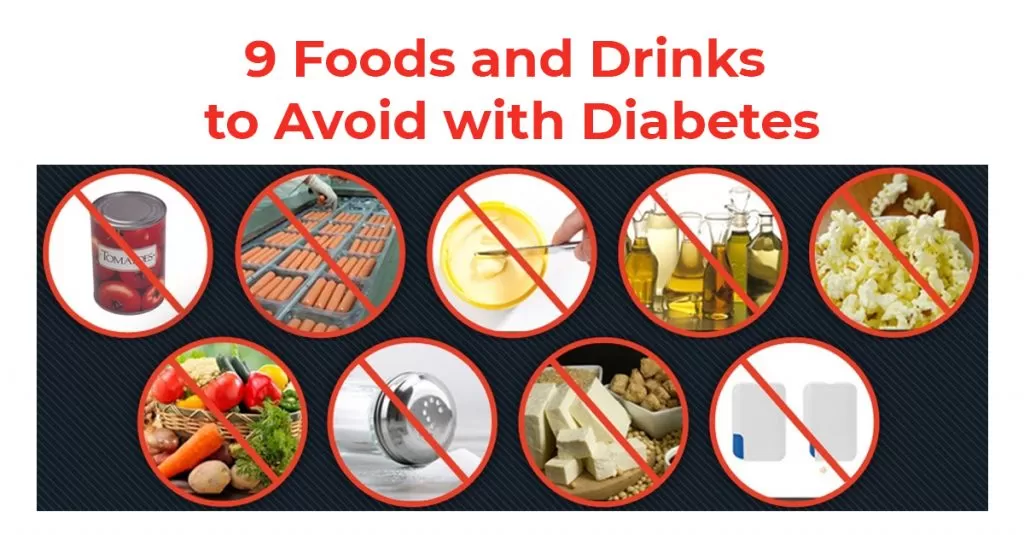9 Foods And Drinks To Avoid Eating Or Consuming With Diabetes

Table of Contents
Diabetes is a chronic metabolic disorder in which the body does not produce sufficient insulin or if there is a defect in the insulin uptake by cells. It can affect almost all age groups, children and adults worldwide. It is not curable, but it can be controlled and managed through medication, lifestyle adjustments, and management of its symptoms and complications. When left untreated, the disease may cause many serious consequences, such as heart disease, kidney disease, blindness, etc.
Significantly, certain foods can raise your blood sugar and insulin levels and promote inflammation, which may increase your risk of disease.
Types of Diabetes
Type 1 diabetes is believed to be caused by an autoimmune reaction in which the body mistakenly attacks itself and destroys beta cells in the pancreas that make insulin. Type 1 is called insulin dependant and is managed by insulin therapy. It can affect all age groups, including children.
Type 2 is the most common and affects mainly the adult population. Therefore, let us discuss type 2 in detail as it is the most prevalent form and depends on the lifestyle factors.
Symptoms of Diabetes
- Increased thirst
- Increased urination
- Increased hunger
- Blurred vision
- Fatigue
- Frequent infections
- Sores and wounds that do not heal
- Darkened skin, often in the armpits and neck
- Numbness, tingling, or pain in the feet or hands
Causes of Diabetes
Type 2 diabetes is caused by several factors such as:
- Genetics
- Family history
- Lifestyle factors
- Being overweight or obese
- Physical inactivity
Risk Factors for Type 2 Diabetes Include:
- Low HDL cholesterol or high triglycerides
- High blood pressure
- Old age
- A history of heart disease or stroke
- A history of gestational diabetes
- Polycystic ovary syndrome (PCOS)
- Depression
Diagnosis
Diabetes can be diagnosed through a blood sugar test. Other tests done to check the blood sugar levels are:
- HbA1C test
- Fasting plasma glucose (FPG) test
- Glucose challenge test
- Oral glucose tolerance test (OGTT)
- Random plasma glucose (RPG) test
Treatment for Diabetes
Once diagnosed, diabetes can be challenging to treat entirely, but it can be controlled and managed through lifestyle modifications and medications. Besides drugs, exercises, and other workouts, the diet plays a crucial role in maintaining and managing diabetes. Therefore, a good diet is vital for diabetes reversal. Here, we list the foods that one should avoid with diabetes.
Foods and Drinks to Avoid with Diabetes
Food habits and lifestyle factors usually trigger diabetes. So, following a proper diet and exercise routine is essential to maintain the optimum blood sugar level and prevent further complications. A good diet plan is necessary for keeping blood sugar under control. A high glycaemic diet causes sudden blood sugar spikes, so it should be avoided in people with diabetes. Some of the foods and drinks to avoid with diabetes are:
1. Trans fats
Trans fats are unsaturated fats that are chemically altered and created by adding hydrogen to unsaturated fatty acids to make them more stable to increase their shelf life and stability. Unfortunately, the food items with such trans fats have been linked to inflammation, insulin resistance, increased belly fat, lower levels of HDL cholesterol, impaired arterial function, and heart disease.
Trans fats are found in packed foods such as peanut butter, spreads, creamers, crackers, muffins, and other baked goods to extend the shelf life of the products.
Avoiding any food product with the words “partially hydrogenated” label is better.
2. Fruit Juices and Sugary Beverages
Fruit juices and sugary beverages have a high glycaemic index value, affecting blood sugar levels immediately. Therefore, always opt for unsweetened fruit juices and cut fruits. High levels of fructose in fruit juices and sugary beverages often lead to cardiac problems, increased cholesterol and triglyceride levels, fatty liver and insulin resistance leading to belly fat and obesity.
Though fruit juices are often considered healthy, their effects on blood sugar are similar to sodas and other sweetened drinks. Certain fruit juices are even higher in sugar and carbs than soda.
3. Refined Carbs
Food items such as pasta, bread, bagels, and other refined-flour foods are rich in carbs and low in fiber content. Eating such foods causes sudden spikes in blood sugar levels.
Fiber helps slow down the digestion and absorption of sugar into the bloodstream and reduce cholesterol levels. It also helps to increase the gut microbes, which promotes insulin resistance.
4. Crackers and Snacks
Salty foods and snacks are usually prepared with refined flour. They contain fast-digesting carbs, which shoot up blood sugar levels. They use taste enhancers, colours, and additives that are harmful to the gut.
It is advised to take nuts, whole fruits, or low-carb vegetable salads between meals to satisfy the appetite.
5. Natural Sugars
There is a wrong notion that natural sugars are better than artificial sugars and do not cause much harm. People with diabetes should avoid white sugar, cookies, and candies but other forms of sugar, such as honey, maple syrup, agave nectar, brown sugar, etc., also lead to high blood sugar levels. So, it is better to limit such sugars when diagnosed with diabetes.
6. Dry Fruits and Raisins
They are rich in vitamins, minerals, antioxidants, micronutrients, etc., and are usually very good for health and immunity. But as a result of drying and processing, the dry fruits get loaded with concentrated sugar and contain high carbs compared to fresh fruits.
Stick to fresh fruits and take more low-sugar fruits such as fresh berries and apples to check blood sugar.
7. Processed Foods
Avoid or limit the intake of processed foods such as cookies and candies. These increase blood sugar levels quickly. The preservatives and additives in processed and canned foods can increase blood sugar levels.
Most breakfast cereals are highly processed and contain far more carbs than advertised. They also have significantly less protein and fibre. To control blood sugar and appetite, it is better to avoid such cereals and instead choose a protein-based low-carb breakfast diet.
8. Flavored and Frozen Foods
Nowadays, flavoured foods are gaining much popularity. However, the food items that are usually healthy when taken in plain forms become harmful when added with colours and artificial flavours. Such products include fruit-flavoured yoghurts, flavoured milk drinks, flavoured coffee, etc. They are prepared from low-fat milk and loaded with carbs and sugar.
Many people also consider frozen yoghurt a healthy alternative to ice cream, but it might contain even more sugar than ice cream.
It is good to opt for plain, whole milk yoghurt and plain coffee or espresso, which is beneficial for weight control, and gut health.
9. Deep-fried Foods
Any deep-fried food in excess is harmful to overall health as it increases the body’s triglycerides and blood sugar levels. French fries are the most popular snacks which people eat more often. It is best to steer clear of French fries and other deep-fried foods, especially if you have diabetes.
Deep-fried foods have been reported to produce high amounts of toxic compounds, such as advanced glycation end products and some aldehydes. Such compounds may promote inflammation and increase the risk of diabetes, heart disease, and cancer.
Diabetic Care
Diabetes is one of the silent killer diseases. However, the condition may have severe consequences when left untreated or ignored. Some of the tips to prevent such complications are:
- Make healthy eating choices and physical activity a part of the daily routine.
- Maintain a healthy weight.
- Regularly monitor the blood sugar levels.
- Take the medications regularly.
- Avoid smoking or quit smoking.
- Keep the blood cholesterol under control.
- Regularly check the eyes for signs of retinal damage, cataracts, and glaucoma.
- High blood sugar levels may damage the nerves in the feet. Taking care of the feet and treating even minor cuts and blisters is essential to prevent serious infections.
- Manage stress through relaxation techniques.
- Get plenty of sleep.
- Practice dental hygiene properly.
- Practice yoga and meditation as it helps to maintain the harmony of the body and mind.
Dietary Supplements for Diabetes
No clear proof exists that dietary supplements such as vitamins, minerals, herbs, or spices can help manage diabetes. Supplements can be taken if you cannot get enough vitamins and minerals from foods. It is essential to take the advice of a health care provider before taking any dietary supplement since some can cause side effects or action of the medicines. Some of the supplements that can be useful for managing diabetes are:
Apple Cider Vinegar
The primary compound of apple cider vinegar is acetic acid which has been proved to have various health benefits. For example, two tablespoons of apple cider vinegar daily before bedtime can reduce fasting sugar levels. In addition, it can be taken with meals to decrease the glycaemic index of a meal.
Fiber
Barley is one of the high-fiber, high-protein grains reported to improve blood sugar, insulin, cholesterol, and general inflammation. The recommended amount of fiber is about 30 grams per day. Adding more fiber to the food decreases the blood sugar and insulin levels in the blood.
Mineral Supplements
Chromium
A chromium deficiency may disrupt glucose metabolism. Research and studies have proven the efficiency of chromium in lowering blood sugar and HbA1c levels.
Zinc
Studies have shown zinc supplementation can reduce blood sugar and HbA1C, have an antioxidant effect, lower blood sugar, and even help treat some of the complications related to diabetes.
Herbal Supplements for Diabetes
Aloe Vera
The sap of aloe vera is known for its laxative effect.
Berberine
Many studies support the use of berberine in decreasing blood sugar and hba1c.
Cinnamon
It helps to lower blood sugar and cholesterol levels.
Fenugreek
Fenugreek seed has been used for centuries for its medical benefits in lowering cholesterol and hba1c.
Sadabahar
They are also known as periwinkle, a medicinal plant in India. The leaves and flowers of the plant are used in treating type-2 diabetes.
Giloy
This plant’s leaf extract helps boost immunity and is rich in antioxidants. It is used to treat the symptoms of diabetes.
Jamun
The berries’ seeds stimulate insulin secretion and speed up the wound healing process in diabetic people.
Gymnema
Gymnema has been widely used in India for centuries to improve glucose metabolism and increase insulin levels and healing properties.
Ayurvedic Herbs for Managing Diabetes
The herbs that are primarily used to treat diabetes are shilajit, neem, coccinea indica, Amalaki, Triphala, turmeric, saptrangi, vizaysaar, gurmar, tulsi, Guggulu, bitter gourd, rose apple, leaves of bilva, cinnamon, Gymnema, fenugreek, bay leaf, and aloe vera. Plain decoctions of Triphala, fenugreek, and shilajit are commonly used to treat diabetes. In addition, some herbs are given in the form of powders such as Amalaki churna, turmeric powder, naag bhasma, etc. The Ayurvedic preparations ‘Vasanta Kusumakar Ras’ and ‘Chandraprabhavati’ are known to lower blood sugar levels effectively.
Some proprietary Ayurvedic medications can also be used along with the main medications to treat diabetes. Some of the best products available for treating diabetes are Sunova’s, Sunova Bioslim + Diabetic Care, Sunova Bioslim + Dr. Shugar, Sunova Diabetic Care, Sunova Diabetic Care+ Dr. Shugar, SUNOVA DR. SHUGAR, Sunova Organic Spirulina Capsule + Dr. Shugar, etc.
Any herbs, supplements, or medications should be taken under the guidance of the registered medical practitioner or healthcare provider to prevent any harmful side effects.
Takeaway
Diabetes is a metabolic disorder that affects glucose metabolism. Being diagnosed with diabetes does not mean they cannot eat what they like. A proper meal plan which includes most foods from each food group like carbohydrates, protein, fat, etc., can be taken in smaller portions regularly and at regular intervals and a proper set schedule. A healthy, balanced diet can help manage the symptoms and reduce the risk of complications of diabetes. Avoiding foods that increase blood sugar levels and regular physical activity can help a person lead a healthy life. In addition, certain minerals, herbs, and other dietary supplements can be taken as complementary treatment with the proper guidance of a registered medical practitioner.







